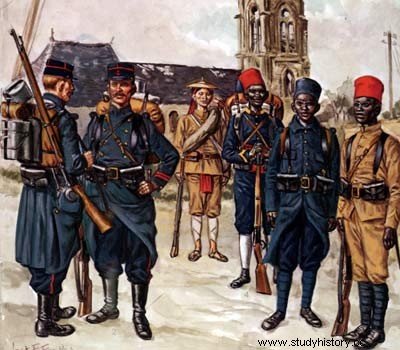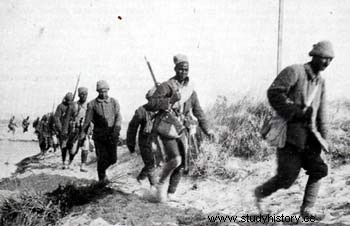Russia, in difficulty in front of Kars, asks its allies for a diversion, but France and Great Britain believe that an important action could modify the whole physiognomy of the war:the opening of Bos. Phore would exonerate Turkey, restore direct relations with Russia, give absolute supremacy to the allies in the Balkans, where Bulgaria and Rumania are still hesitant. The first attempts to force the Dardanelles ended in serious failure on March 18 and the loss of several battleships.
-

- Dardanelles campaign
We then had recourse to an expeditionary force comprising, under the orders of General Hamilton, four British divisions, and the French group of General d'Amade, in which figured the 2nd Mixed Colonial Brigade (4th and 6th RMIC, each strong of one white battalion and two black battalions).
Gathered in Egypt, this group is directed on April 25 towards Sebd Ul Bahr, on the European coast, or towards Khoum Salé, on the Asian side, where a diversion will be carried out entrusted to Colonel Ruef, commander of the colonial brigade, with the 6` RMIC, a battery of 75, genius, etc. It is a magnificent coup executed, under the beard of the Turks, by the Senegalese, who from Khoum Salé, breaking several severe counter-attacks, rush towards Orhanié. The order to withdraw was given in the afternoon. We have lost 750 men and 20 officers, but the adversary admits having had 1730 killed, wounded and prisoners, and this operation, "admirably conducted" in the words of General Hamilton, will fix on the Asian coast a certain number of Turkish divisions, which did not reach the European coast until after April 29.
-

- Dardanelles campaign
Meanwhile, the bulk of the British forces landed with French elements between Cape Tekké and Sebd Ül Bahr, and east of Morto Bay. The progression from April 27 to 29 hardly exceeds 4 or 5 kilometers. The colonial brigade, framed to the north by the British, to the south by the metropolitan brigade, leaned against the bay of Morto, and suffered, from May 1 to 4, violent Turkish attacks, reinforcements and in particular the arrival of A new French division including the 4th Colonial Mixed Brigade (7th and 8th RMIC) made it difficult to stabilize the situation.
These elements, barely landed, took part in an offensive on May 6 and 7 with a view to capturing the western plateau of Kerevés Déré, and the spur 1,800 meters south of Krithia, the British objective, and key to the entire peninsula. from Gallipoli. Very hard fights, and gain of only one kilometer, appreciable however, because the rear area, although reduced, widens accordingly.
General Gouraud, who took command of the French expeditionary corps on May 14, considered it essential to extend this rear area by creating stores and intermediate depots on the island of Lemnos:thus each battalion would have 300 men sheltered from fire and kept in good physical condition, ready to intervene at short notice as reinforcements in the battle. On the other hand, taking advantage of his experience acquired in the denuded and deprived lands of Champagne, Gouraud proceeded to a methodical reorganization of the position, and the situation improved markedly when on June 1st General Hamilton decided to resume the offense.
This gave rise to a series of battles staggered in such a way that almost all the Allied artillery could alternately support the effort of the assault troops. On June 30, the colonials played a decisive role in the removal by the 2nd Division of the important Turkish work of the "quadrilateral". This success was overshadowed by the serious injury of General Gouraud, who handed over his command to General Bailloud. For weeks murderous attacks and counterattacks follow one another without appreciable result.
Also, fearing not to be able to obtain a decision in the peninsula of Gallipoli, the allies are looking for another theater of operations in the East, and the entry into the war of Bulgaria against us, at the end of September 1915, led to opening this new front in the Balkans, starting from Salonika.
The evacuation of the peninsula will be staggered until December, facilitated by a certain inertia of the Turks, undoubtedly due to the moral superiority acquired by our troops, and in particular the colonials and Senegalese, during a fight without thank you for several months. France sent 79,000 men to the Dardanelles - more than 27,000 were killed or wounded, and the share of the colonial troops in this sacrifice reached two-thirds. These, grouped into a 17th colonial division under the command of General Brulard, will be the last to leave this position, where for nearly a year important Turkish forces had been immobilized.
